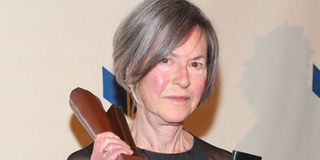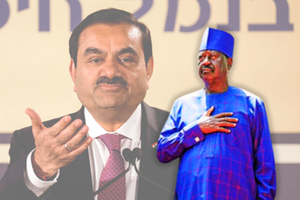2020 Nobel Prize celebrates political indifference

Louise Gluck attending the 2014 National Book Awards in New York City on November 19, 2014. The Nobel Literature Prize went to Ms Gluck, the jury at the Swedish Academy said.
What you need to know:
- Truly, Glück’s poems have some magnetic pull to them, often blending the surreal with the banal, yet revealing the timeless anxieties of human existence.
- In 'The Red Poppy', for instance, she begins: “the great thing / is not having / a mind / Feelings: / Oh, I have those; they / govern me / … I speak / because I am shattered.”
The annual ritual of speculation on who wins this year’s Nobel Prize for Literature came to an end on Thursday with the announcement that American poet, Louise Glück, had been awarded the prize for what the Nobel Prize Committee described as her “her unmistakable poetic voice that with austere beauty makes individual existence universal.”
Truly, Glück’s poems have some magnetic pull to them, often blending the surreal with the banal, yet revealing the timeless anxieties of human existence. In 'The Red Poppy', for instance, she begins: “the great thing / is not having / a mind / Feelings: / Oh, I have those; they / govern me / … I speak / because I am shattered.”
Like an excellent student of Baldwin, Glück writes a sentence clean like a bone. And what begins as the persona’s playful rejection of the norm ends up as a hint of deep seated trauma, suggesting the common sense knowledge that many of us carry burdens of unknowable struggles, only that this bit of common sense is relayed so profoundly.
One can go on marvelling at the beauty of Glück’s narrative poetry. In 'Vesper', she uses botanical imagery to bring out the theme of human failure, more as the norm rather than the exception, while in other poems, she draws on Greco-Roman mythology to render narrative poems that employ classical motifs and images to speak to contemporary societal ills.
This, in “Persephone the Wanderer”, appears in the forms of moral and ethical degeneration; rapes and murders, and the dilemmas of whether physical desires undermine moral integrity. Eventually, the poem’s ending on a pro-choice note – “My soul / shattered with the strain / of trying to belong to earth— / What will you do, / when it is your turn in the field with the god?” – highlights the poet’s preference for existential freedom that many scholars in the humanities and social sciences have called for.
Stylistic brilliance
The stylistic brilliance and thematic depth of Glück’s poetry is without doubt worth the Nobel and more, as evidenced by her earlier winning of the National Humanities Medal (2016), the National Book Award (2014), and the Pulitzer Prize (1993).
Yet her triumph in winning the Nobel is, for me, both fascinating and alarming. The fascination derives from the way her award re-centres poetry in a literary world that, despite all, is dominated by prose. This is somewhat ironical, given that way back, to be a poet was the last stage of growth before one became a god.
With time, and for different reasons, however, poetry was banished to the fringes of literary consumption, giving way to the majestic novel that became the literary genre of choice, notably at the peak of European imperialism and its expansionist tendencies of the 17th Century onwards.
However, with the seemingly inevitable decline of the novel as the medium of national and other group narration, a development that derives from the ubiquity of digital revolutions, the short story has become more promising as the new vehicle for individual and individual literary imaginaries.
Poetry, at least its variant that is associated with abstract canonical thinking of the likes of Ezra Pound, Butler Yeats, T.S. Eliot and their afro-centric heirs – think about the early Wole Soyinka and Christopher Okigbo – is comatose, having suffered formal strangulation by later voices that were more concerned about inclusive readerships.
I suppose that is why even relatively recent Nobel Prize winners whose forte was poetry, such as Irishman Seamus Heaney, continue to suffer what fair observers may deem unfair obscurity. And so Glück’s win this past week may well signal a sort of a comeback for a genre that has been subordinated to its more receptive genres.
It also noteworthy that the winner is a woman. For me, and this is the bit I find alarming, the significance of this is not so much to celebrate the truism that women are good or better writers than men.
It is more in emphasising the embarrassing masculinization of literary awards of a global reach, yet again raising questions about what really informs the decisions of the panellists who decide which award goes where. It is, clearly, not entirely literary; it is more of tweaking parameters of gate-keeping mechanisms that don the camouflage of quality while serving the long held prejudices of the old white males, if you allow me to borrow the cliché. Or how else can one intelligently explain how, out of the 116 previous awards of the Nobel in Literature, now 117, only 16 were women?
For me, the search for answers to this question – and in respect to other categories that have been locked out, Africans for instance – can be helped by scrutinising the citations that accompany such awards.
Resuscitate the ghosts
Not only are most of these citations foggy, they also tend to resuscitate the ghosts of Eurocentric lenses through which the rest of the world is viewed, while simultaneously reinforcing sweeping presumptions that what is made in Europe or America in a way speaks for and to the whole of humanity.
There are ample illustrations that classical Greek drama had variants in other parts of the world; indeed, some African playwrights – for instance Ola Rotimi and Wole Soyinka – have shown parallels between ideas of Greek tragedy and traditional Yoruba belief systems. Yet, Glück’s poetry in which she revisits and reworks Greek mythology, are cited as part indicators of her poetic genius, as though Greek traditions had no parallels or equivalents anywhere else.
This reification of Eurocentric thought systems is made complete by cerebral yet hollow citations that do not communicate much. In plain English, one wonders, what does Anders Olsson – chairperson of the Nobel Committee – mean when he says that Glück’s “unmistakable poetic voice that with austere beauty makes individual existence universal” mean? Or that her poetry, “candid and uncompromising …full of humour and biting wit” is “characterised by a striving for clarity.” The more I think about these lines, the more I find myself slipping further and deeper into metaphysics.
These lines and the entire citation can mean anything; they can equally mean nothing. This is so not just because of the citation’s sweeping reach, but perhaps because the same attributes can easily be spotted in the works of many other poets and, indeed, playwrights and novelists.
The only difference is that for other writers – poets, playwrights, and novelists – especially in the Global South where we have to make do with Nobel Peace Prizes and occasional token recognition, their “candid and uncompromising” voices are usually in defence of a people’s violated dignity, an urgent need for political affirmation, and the larger project of decolonization, which, of course, is not in the interest of the Nobel Committee to acknowledge.
They would rather celebrate the political indifference for which the poems of Glück are known, although she writes in a country where racism remains a festering wound, and in a world where America is easily the most notorious bully, war monger, and most unscrupulous merchant in military ware.





